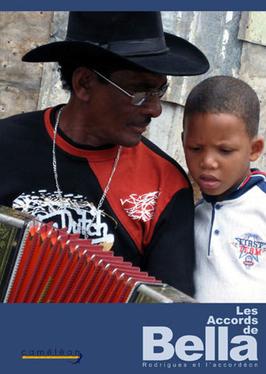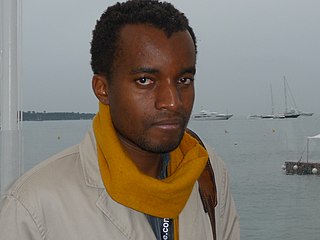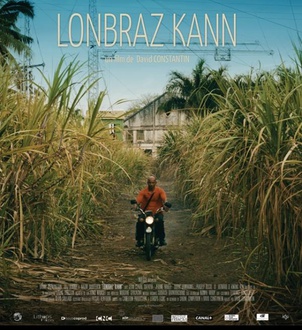David Constantin | |
|---|---|
| Born | 26 July 1974 |
| Nationality | Mauritian |
| Occupation | Filmmaker |
| Known for | Les Accords de Bella |
David Constantin (born 1974) is a filmmaker from Mauritius.
David Constantin | |
|---|---|
| Born | 26 July 1974 |
| Nationality | Mauritian |
| Occupation | Filmmaker |
| Known for | Les Accords de Bella |
David Constantin (born 1974) is a filmmaker from Mauritius.
Constantin was born in Mauritius Island in 1974. He obtained a degree in Information and Communication, and then attended the ESAV (Higher School of Audiovisuals) in Toulouse. [1] He made his first short film in 1998. [2] After spending five years in France studying cinematography he returned to Mauritius in 2003. In 2007 he organized ILE COURTS, the first short film festival in Mauritius. [1] David Constantin has established an audiovisual research laboratory at the Charles Baudelaire Cultural Centre. He gives introductory courses for teachers on analysis of the image. [2] He has given seminars on aspects of film for the Université populaire de l'Ile Maurice. [3]
In 2002 Constantin directed and produced the short film Diego l'interdite (Diego the Forbidden). This is a documentary about the deportation of the people of the Chagos Island in the Indian Ocean by the US and UK governments. [1] The film won the European Grand Prix of First Films 2002 and Vues d'Afrique 2003. [4] In the years that followed he directed and produced a number of documentaries and short films. He won awards in film festivals such as Vues d’Afrique (Montreal), Amiens (France), Réunion and Milan. [1] His 2005 short Bisanville (l'Autobus) won prizes at the International Film Festival of Amiens in 2005 and the 12th Film Festival of Africa and the Islands, Reunion 2005. [5] His short comedy Made In Mauritius was screened at the 2010 African Film Festival of Cordoba. [6] It was also screened at the 22nd African, Asian and Latin American Film Festival in Milan in March 2012. [2]
Selected videos: [7]
| Year | Title | Role | Notes |
|---|---|---|---|
| 2003 | Colas | Director | 15 minutes. Short fiction. |
| 2003 | Diego l'interdite (Diego the forbidden) | Director, producer, screenwriter | 52 minutes. Islander are evicted to make way for the Diego Garcia naval base |
| 2005 | Bisanvil (l'Autobus) | Director | 13 minutes. Portrait of Mauritian people on a bus journey |
| 2007 | Les Accords de Bella | Director | 52 minutes. Documentary about accordions on Rodrigues Island |
| 2009 | Made In Mauritius | Director, screenwriter | 7 minutes. Short comedy |
| 2009 | Ruz | Cinematography | 6 minutes. Directed by Gopalen Parthiben Chellapermal |
| 2014 | Lonbraz Kann [8] | Director, producer, Co-screenwriter | 1hr 28 minutes. Drama |
| Dibut Lor Nu Lipié | Director | Documentary on poverty eradication in Mauritius |

The Mascarene Islands or Mascarenes or Mascarenhas Archipelago is a group of islands in the Indian Ocean east of Madagascar consisting of islands belonging to the Republic of Mauritius as well as the French department of La Réunion. Their name derives from the Portuguese navigator Pedro Mascarenhas, who first visited them in April 1512. The islands share a common geological origin beneath the Mascarene Plateau known as the Mauritia microcontinent which was a Precambrian microcontinent situated between India and Madagascar until their separation about 70 million years ago. They form a distinct ecoregion with unique biodiversity and endemism of flora and fauna.
The Festival of African Cinema (FCAT), also known as Tarifa-Tangier African Film Festival, originally African Film Showcase of Tarifa (2004–2006) and formerly African Film Festival of Tarifa (2007–2014), the African Film Festival of Cordoba (2012–2015), is an annual festival devoted to African cinema held in the Spanish city of Tarifa and the Moroccan city of Tangier.
The Cassava Metaphor is a 2010 film.
Le Rêve de Rico is a 2001 short film. The film was awarded at the Directors' Fortnight of the Cannes Film Festival.
Made In Mauritius is a 2009 short comedy drama film directed by Mauritian director David Constantin. In 2011 it was the first ever Mauritian film to be selected as part of Official Selection at the Clermont-Ferrand International Short Film Festival. It also screened at the 2011 Festival Cineafricano where it was awarded the Prix Fondation Pellegrini and at the Rencontres d’Hergla (Tunisia) in 2012.
Black music, des chaînes de fer aux chaînes d'or is a French 2008 documentary film about African-American music.
Diego l'interdite is a Mauritian 2002 documentary film directed by David Constantin.

La Robe du temps is a 2008 film from Niger directed by Malam Saguirou, whose documentaries have won a number of international awards.

Le Beurre et l'argent du beurre is a 2007 documentary film directed by Alidou Badini and Philippe Baqué. The title, which translates to "Butter and the money from butter", derives from a French idiom equivalent to the English phrase "Have one's cake and eat it too".

Les Accords de Bella is a 2007 anthropological documentary film directed by David Constantin. It was selected by the African Film Festival of Cordoba - FCAT.
Monique Mbeka Phoba is a filmmaker whose family comes from the Democratic Republic of the Congo (DRC) but who now lives in Benin. Her films have won a number of awards.
Lumumba, la mort du prophète is a 1990 documentary film by Haitian director Raoul Peck. It covers the death of Patrice Lumumba, the first prime minister of Zaire, now the Democratic Republic of the Congo. The film was critically acclaimed and won a number of awards. In July 2021, the film was shown in the Cannes Classics section at the 2021 Cannes Film Festival.

Kivu Ruhorahoza is a Rwandese film director, writer and producer. He is internationally known for his feature film Grey Matter which won the Jury Special Mention for Best Emerging Filmmaker at the 2011 Tribeca Film Festival and the Ecumenical Jury special mention at the 2011 Warsaw Film Festival. He also won the Grand Prize of the Tübingen French Film Festival, Best Director and Signis Award of the Cordoba African Film Festival and the Jury Special Prize of the Khouribga African Film Festival in Morocco.

Taïeb Louhichi was a Tunisian film director, screenwriter, producer and filmmaker. His best known works include his debut feature film, Shadow of the Earth (1982), Layla, My Reason (1989), and La Danse Du Vent (2004).

Lonbraz Kann is a 2014 Mauritian film directed by David Constantin.

Jean-Marie Teno is a Cameroonian film director and filmmaker, "one of Africa's most prolific filmmakers". His films address censorship, human rights violations, globalization, and the effects of colonialism. Teno has made films in many different forms but favors making documentaries. In an interview when asked about his favor style of film to make he responded, "documentary because when you do fiction, people think it's not true. When it's the documentary, they are embarrassed, embarrassed".
The Central African Republic is one of the world's poorest countries and the film industry is correspondingly small. The first film made in CAR appears to have been Les enfants de la danse, a short French-made ethnographic documentary of 1945. Joseph Akouissone was the first Central African to make a film in the country, with his 1981 documentary Un homme est un homme; he was followed by the documentaries made in the 1980s by Léonie Yangba Zowe. Since then a series of ongoing conflicts and economic crises have severely limited the potential growth of film-making in the country. The first feature-length drama made in the country was Le silence de la forêt, a 2003 CAR-Gabon-Cameroon co-production about the Biaka people.
The Flore des Mascareignes is a flora, in French, covering the three islands in the Mascarenes: Réunion, Mauritius and Rodrigues.
Île Courts International Short Film Festival was an annual autumn festival of world cinema on the island of Mauritius, with a focus on short films from the Indian Ocean area. It was organised from 2007 up to 2018 by the local non-profit Association Porteurs d'Images with David Constantin and others, featuring screenings at various locations on Mauritius, including villages and beaches. Film entries should run no longer than 30 minutes, be spoken or subtitled in French or creole, and fall in one of the genres fiction, documentary, animation, or experimental film.